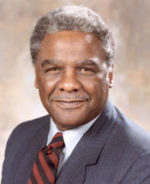It’s election season in Chicago, and every candidate for Mayor is black, but one. This was the complete opposite in 1983, when Harold Washington, a black man, ran for Mayor and won. I had never heard of Harold Washington until I moved to Chicago, but he is someone we all should know, not just Chicagoans. Many Chicagoans highly regard Harold Washington, and for a good reason. He was a pioneer, a person who overcame obstacles and disproved common misconceptions, and he did it all while serving as the mayor of one of the most significant cities in the world. He was the first Black American to be elected mayor of Chicago in 1983, and his influence may still be seen today.
Early Years
Harold Washington was born in Chicago’s Bronzeville neighborhood, and grew up in the city’s segregated housing projects. In 1922, the son of a well-known attorney and influential local figure.
He served in the American Army during World War II, and for the wounds, he received while fighting, he was given the Purple Heart. Before joining neighborhood politics in the 1960s, he graduated from Northwestern University School of Law and Roosevelt University. Washington practiced law and served in the Illinois State Senate and the U.S. House of Representatives before entering politics. Washington was a racial equality activist who supported civil rights and assisted in planning the 1963 March on Washington. He served as mayor from 1983 until his 1976 election to the Illinois State Senate.
His campaign
His campaign was historical. In the Democratic primary, he ran against two white opponents regarded as more mainstream than Washington. But because Washington was a captivating orator with a large grassroots following, he was able to pull off a shocking upset. The first Black American to assume the position of mayor in the city’s history, he went on to win the general election with a resounding victory.
Washington faced particular challenges throughout his tenure as mayor, though. Some city council members opposed him because he was trying to change the status quo.
In 1983, he defeated Republican contender Bernard Epton and incumbent Jane Byrne to win the race for mayor. His win was a pivotal moment in history for the African American community.

Later Life
Washington passed away from a deadly heart attack in 1987, leaving behind a legacy of development and transformation that continues to motivate Chicagoans today.
His legacy
His Influence Harold Washington had a significant impact on Chicago. He was a leader who put in an endless effort to improve the city’s equity and justice for its citizens.
- His dedication to diversity and inclusion paved the path for later generations of minority leaders. His influence is still felt in the city’s numerous community groups and social justice movements.
- Washington’s contribution to advancing civil rights in Chicago is among his most significant accomplishments. He tried to address racial inequity and prejudice issues as the city’s first African American mayor.
- To foster better links between the city and minority populations, he established the Office of Intergovernmental Affairs. He appointed a diverse set of people to important posts in his administration.
- During his tenure as mayor, Washington also substantially contributed to the city’s economic growth. He pushed to bring new companies to Chicago, aiding job growth and economic expansion. Also, he promoted programs for affordable housing and tried to enhance the city’s public transit system.
- Washington’s dedication to openness and accountability in the government is another significant aspect of his legacy. He tried to open up government information to the public and established a task group to investigate local government corruption. Also, he set up the Office of the Inspector General to look into claims of wrongdoing in local government.
In honor of Harold Washington
Various locations, all in Chicago, have been named after him, including:
–Harold Washington Community College.
–Harold Washington Library is in Chicago’s loop and is the main library in Chicago, with a statue of him in the lobby entrance.

-There is a park called Harold Washington Park in the Hyde Park district.
-The Harold Washington Cultural Center is a performing arts and cultural facility.
-The Roseland area is home to Harold Washington Elementary School, a primary school.
-Harold Washington Academy High school.
In addition, Harold Washington is commemorated in numerous American cities by naming streets, buildings, and other landmarks.
Conclusion
In conclusion, Harold Washington’s election as Chicago’s first African American mayor was a momentous occasion that will live on in history. He advocated for social justice, diversity, and accountability, and the region and its people will never forget his impact.


